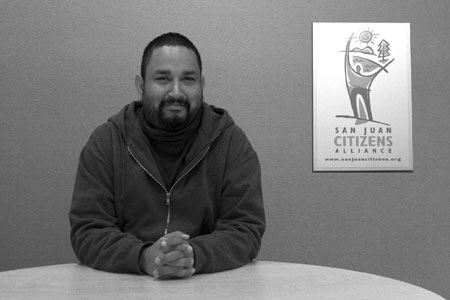|
| ||
| Reforming immigration SideStory: A different flavor of reform: Some groups call for stricter immigration policies
by Will Sands A Durangoan was recently pulled over for traveling a few miles over the speed limit. Also a Latino, the man was asked if he had a green card by police officers. He replied “no,” was promptly given a speeding ticket and released. However, based on his response, officers then obtained an arrest warrant. Shortly thereafter, they apprehended the local man at his home on charges that he was an illegal alien. The man was transported to a holding cell in Aurora, where he spent three weeks waiting to tell his side of the story to a judge. Yes, it was true that he did not have a green card. He didn’t need one. He was actually a U.S. citizen. Immigration policy problems like these confront Eddie Soto constantly. The director of Los Compañeros, the Durango-based immigrant-rights coalition, is surrounded by community members who have dealt with similar violations of their rights. “The search for undocumented immigrants has taken on a new level of paranoia, and it’s beginning to affect everyone in the community,” Soto explained. “The victims are getting victimized again and again.” In addition to cases of mistaken identity and mistaken imprisonment, national immigration policy hits La Plata County in a variety of ways. For Soto, families are one of the biggest casualties of the current rules. “Right now, with the current immigration system, we have families that are being kept apart for 10 to 18 years,” he said. “In the old days, once you entered the U.S. and declared your intention to become a citizen, they could go ahead with your paperwork. Now, you can’t be here during the process, and it can mean more than a decade apart from your spouse or children.” The list goes on to include overly bureaucratic paths to citizenship, a worker program that violates immigrants’ civil rights and the lack of measures to integrate immigrants into existing communities. This combination has led the Colorado Immigrant Rights Coalition (CIRC), a coalition of 80 groups including Los Compañeros, to call for immediate change. The group has announced a blueprint for comprehensive immigration reform and has taken the call to Washington, D.C. “The top priority is that members of our community who currently reside in the United States can have the option to come out and apply for legal residency,” explained Julien Ross, of CIRC. “There are a million men, women and children who are contributing to our economy and our system, but are living in the shadows because of a broken system.” Building walls and closing borders will not solve the problem, according to CIRC. The socio-economic realities of North America dictate that there will always be a flow of people from south to north. “The reality is that there is a wage disparity and an economic disparity with our countries to the south,” Ross said. “There is always going to be future flow of immigration. We’re pushing for a worker program that will respect the rights of families participating in that flow.” The issue is also much bigger than immigrants, according to Soto. “The problems with immigration are not about browns vs. whites,” he said. “This is about all workers having the same rights. The disparity between lower income people and the top wage earners in the population is the real issue here. Unfortunately, we’re at a point where Hispanics are becoming the scapegoats for all our major problems.” Last week, four members from four Colorado immigrants’ rights groups took the blueprint for reform to Washington, D.C. Fort Lewis College student and Durango High School graduate Gerardo Flores was among them and spoke at the Capitol on behalf of Los Compañeros. While there, he also raised another immigration issue – The Development, Relief and Education for Alien Minors (DREAM) Act. The act applies to children whose parents emigrated illegally and have been excluded from public education. It simply asks that children who are state residents be entitled to in-state tuition as well as public education. “You have people who, through no fault of their own, are being punished,” Soto said. “We’re not talking about scholarships, we’re talking about access to education. To me, it makes perfect sense. They are residents of the state. Why shouldn’t they have the same benefits. We’re only going to better the state.” Immigration reform is beginning to make sense to others as well, and some are in high places. Senators John McCain, R-Ariz., and Ted Kennedy, D-Mass., are currently drafting legislation to reform the immigration policy. The wording has yet to be revealed, but Ross said that Capitol Hill is paying attention, and there is sure to be movement in the right direction. “We also anticipate some kind of companion bill in the House,” he said. “I’m sure there will be some compromises, but I hope the final package will reflect some of our priorities.” Immigration reform will also take center stage in communities throughout Colorado in coming months. Mobilizations, rallies and marches are being planned across the state. Ross concluded that immigration’s time has finally come. “The fact is that it’s time for this issue to be heard,” he said. •
|
In this week's issue...
- December 18, 2025
- Let it snow
Although ski areas across the West have taken a hit, there’s still hope
- December 18, 2025
- Look, but don't take
Lessons in pottery theft – and remorse – from SW Colorado
- December 11, 2025
- Big plans
Whole Foods, 270 apartments could be coming to Durango Mall parcel


